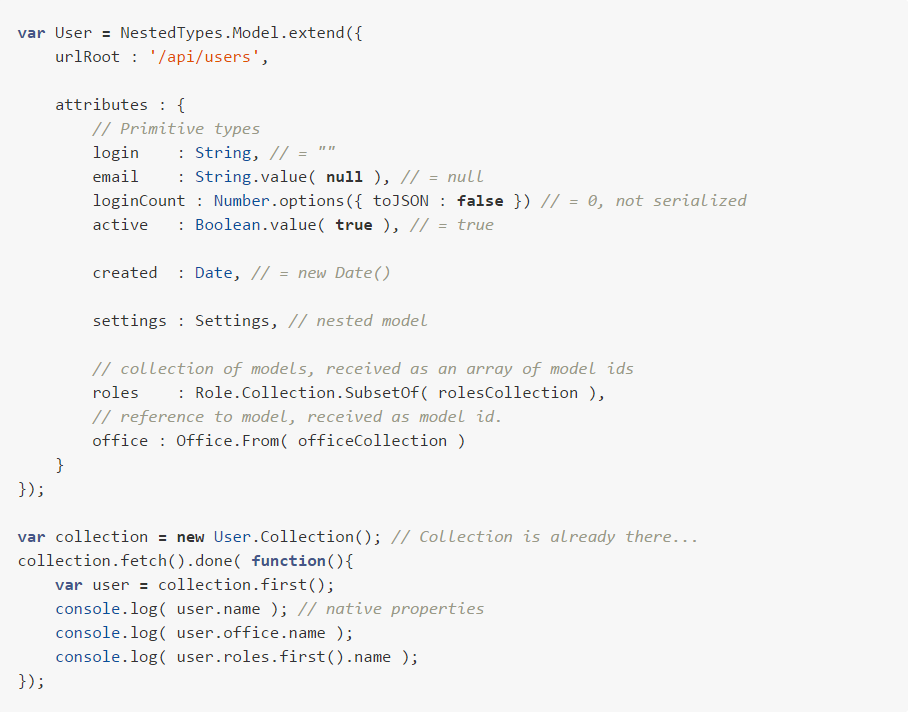NestedTypes
Next generation data framework
Dates

Plain Backbone
- No nested models
- No support for Date type
- No subviews
Basics
Native properties
- are created for default model attributes
- explicitly declared for Model and Collection
- serve as calculated properties
- direct support for lazy evaluation pattern
Lazy initialization
var C = Nested.Collection.extend({
properties : {
index : function(){
if( !this._index ){
this._index = new Index( this );
this.listenTo( this, 'change add remove reset', function(){
this._index.rebuild( this );
});
}
return this._index;
}
}
});
var c = new C(); // no index at this point...
if( c.index.has( 'name' ) ){ // c.index is created
...
}Model.defaults
var UserInfo = NestedTypes.Model.extend({
defaults : {
name : 'test'
}
});
var user = new DetailedUserInfo();
console.assert( user.name === 'test' );
user.name = 'admin';
user.roles.push( 'admin' );
<-- user.name native property is created
<-- JSON literals are deep copied
<-- name:'test' is inherited from the base model
var DetailedUserInfo = UserInfo.extend({
defaults: {
login : '',
roles : [ 'user' ]
}
});
Model.Collection
- is created automatically for every Model
- can be customized with Model.collection property
- is inherited from the base model's Collection
var UserInfo = NestedTypes.Model.extend({ defaults : { name : 'test' } }); var users = new UserInfo.Collection();
Model.properties
- explicit native properties definition
- overrides auto-generated native properties
- also works for Collection
Class type
- has backbone-style .extend and .initialize
- can have native properties (Class.properties)
- can trigger and listen to backbone events
Run-time errors
- Attributes must be defined in defaults.
- Model.set argument must be literal JS object.
- Native properties cannot override base class methods.
Type Annotations
Example: handling the Date
var User = Nested.Model.extend({
defaults : {
created : Date,
name : "",
loginCount : 0
}
});
- On new User() - it creates the Date object.
- On user.set and user.fetch() - it parse ISO UTC+0 dates from strings, integer timestamps, and MS timestamps.
- On user.save() - it serialize model.created to ISO UTC+0 datetime string.
Type specs...
- ...are as simple as just mentioning value's constructor in Model.defaults.
- ...is the guarantee that attribute always holds value of designated type, or null.
- ...free you from writing custom .parse() and .toJSON() in most situations.
Constructor Type Spec
var A = Nested.Model.extend({
defaults : {
a : Ctor,
b : Ctor.value( null ),
c : Ctor.value( "something" )
}
});
new Ctor() -->
null -->
new Ctor( "something" ) -->
defaults
null -->
obj -->
new Ctor( 135 ) -->
var model = new A(), obj = new Ctor();
model.a = null;
model.b = obj;
model.c = 135;
Type cast on 'set' -->
Primitive Types
var A = Nested.Model.extend({
defaults : {
str : "",
num : 0,
bool: false,
int : Integer.value( 5 )
}
});
"34" -->
234 -->
true -->
7 -->
var model = new A();
model.str = 34;
model.num = "234";
model.bool = "y"; model.int = 5.6;
String
Number
Boolean
<-- Automatic type detection
Type cast on 'set' -->
var DetailedUserInfo = UserInfo.extend({
urlBase : '/api/detailed_user/',
defaults : {
login : '',
roles : [ 'user' ]
},
collection : {
initialize : function(){
this.fetch();
}
}
});Nested Models
and Collections
Relations by id
Attribute options
NestedTypes
By Vlad Balin
NestedTypes
- 1,100



